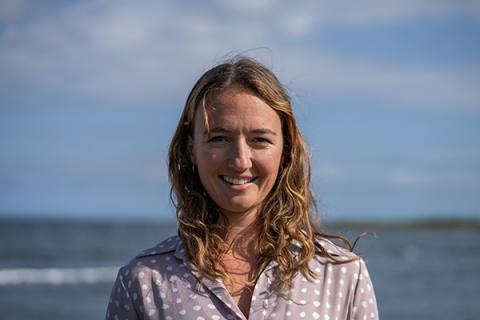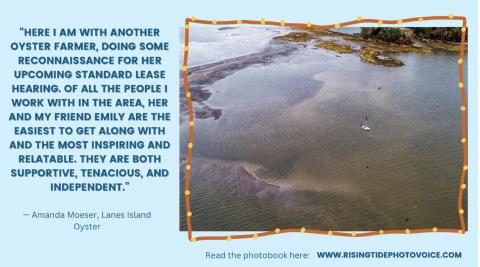Graduate Student Feature: Gender Equity in Aquaculture

For 2021 Graduate Research Fellow Natalie Lord, a season spent fishing in a small-scale salmon fishery in Washington State sparked an interest in aquaculture. She worked on the Lummi Island, WA reefnet fishery in 2019, a historically low year for salmon. “We had very little fish that summer and the salmon stocks in Washington are dwindling right now,” Lord explained. “So that's when I realized that we had to think about alternatives for feeding people. And that's how I came to aquaculture.”
Since joining UNH as a master's student, advised by Catherine Ashcraft, Lord has applied her interest in food security and aquaculture to gender roles and dynamics within the industry, which is an understudied research area. “Globally, there's a lack of knowledge about the roles that women have in the fisheries and aquaculture sector.”
As a recipient of the Graduate Research Fellowship from New Hampshire Sea Grant, Lord dug into the aquaculture industries of New Hampshire and Maine to examine the diversity and equity of these industries in our own backyard. The immediate problem Lord hoped to help solve was that there is virtually no data on gender equity in aquaculture in New England. So, she designed a survey to gather information on the industry and the barriers experienced by its female and non-binary members as well as identify opportunities to support and increase gender equity.
In parallel, Lord ran a PhotoVoice case study: a community-based research methodology where several women in aquaculture were asked to share their stories and reflections on their industry in the first person, combining photos they took during their work with written descriptions and statements. “The goal of the research,” according to Lord, “is to document their experiences as oyster farmers through photography, narratives, interviews, and a focus group.”

As part of her upcoming Master’s thesis, Lord is preparing policy recommendations for organizations like New Hampshire Fish and Game and Maine’s Division of Marine Resources. She’ll be combining the data from the survey with the insights from her photovoice study, which provide different lenses through which to view the same issues. “The survey is great because it provides multiple perspectives. The gender variable is stronger in the survey,” Lord explained. “But as far as learning about experiences and what's really going on in their farms, the photovoice was way more rich data.”
Lord was impressed with the results of the photovoice study and the commitment of the participants. “They just did an amazing job with their writing, the photos that they took, I was like ‘wow, they really got into it!’ There's so much like diversity in what they talked about, but there are also common themes too.”
You can see the photos and read the narratives in her photovoice study on the website Lord created for the project here.

The most prominent theme discussed amongst participants was the gender norms of the aquaculture industry. Entering into a previously male-dominated sector has been a challenge for these women and they are working hard to dismantle the perceptions of traditional roles for women in the maritime sector. They are claiming the identity of oyster farmers and engaging in alternative networks, primarily made up of women, to overcome gender-based barriers and support each other in their entrepreneurial pursuits. Here in the Northeast, aquaculture is a developing sector and women are entering it in full force. Right now, we are in the awareness-building stage to help the institutions, policymakers, and the general public currently supporting this industry acknowledge the diversity of people in the workforce.
Lord will continue her work in policy as a 2023 Knauss Fellow, where she’ll get hands-on experience transferring science into policy through a one-year appointment with a federal government office in Washington, D.C.
See the rest of Lord's work on her project website here!
Interested in one of New Hampshire Sea Grant's Graduate Fellowships?